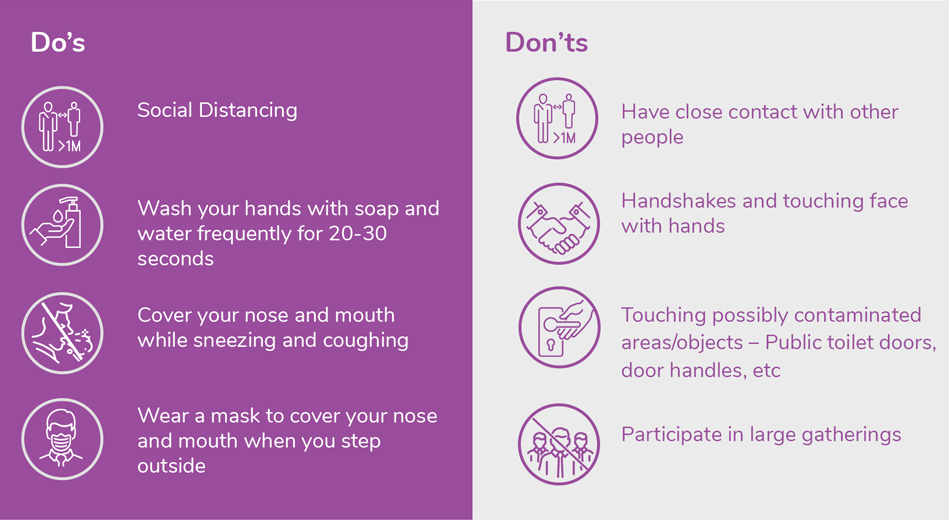COVID-19 (SARS-CoV2)
- COVID-19 infection is caused by SARS-CoV2 virus.
- Rapid and accurate diagnosis of the infection is cornerstone to limit further spread of the virus and ultimately to eliminate the virus from human society.
Register here
Thank you for reaching out to us.We will contact you soon.
COVID-19 Tests offered by MedGenome
| Parameter | RT-PCR Testing |
| Test Code | MGM1669 |
| Test Name | COVID-19 (SARS-CoV2) RT-PCR test |
| Turn Around Time | 24 hours post sample receipt at lab |
| Sample Type |
|
| Method | RT-PCR |
| Geography | Karnataka |
COVID-19 Diagnosis
- Real time reverse transcription polymerase chain reaction (RT -PCR) is the mainstay of SARS-CoV2 detection in vitro. The RT-PCR test is regarded as the current gold standard for molecular diagnosis with high sensitivity. RT-PCR kit is validated by ICMR
- Many variants of concern (VOC) of the SARS-CoV2 virus have been circulating since first reported in December 2020. RT-PCR kits used can detect all the circulating variants
- The CBNAAT test has been authorized by FDA under an EUA for use by authorized laboratories
- Negative results must be combined with clinical observations, patient history, and epidemiological information
COVID-19 Symptoms
- People with COVID-19 have had a wide range of symptoms reported – ranging from mild symptoms to severe illness. Symptoms may appear 2-14 days after exposure to the virus
- This list is not all inclusive. Other less common symptoms have been reported, including gastrointestinal symptoms like nausea, vomiting or diarrhoea
Do's and Don'ts

Who can opt for COVID-19 Test
- Symptomatic international traveller in last 14 days
- Symptomatic contact of lab confirmed case
- Symptomatic Healthcare worker / Frontline workers
- Hospitalized SARI (Severe Acute Respiratory Illness) patient
- Asymptomatic direct and high risk contact of lab confirmed case - family member
- Pregnant woman in / near labour
- Symptomatic (ILI) among returnees and migrants (within 7 days of illness)
- Symptomatic Influenza Like Illness(ILI) patient in Hotspot / Containment zones
- All individuals undertaking travel to countries/Indian states mandating a negative COVID-19 test at point of entry
- All individuals who wish to get themselves tested
FAQ
Novel Coronavirus that causes COVID-19 is thought to spread from person to person, mainly through respiratory droplets produced when an infected person coughs or sneezes. These droplets can transfer to people who are nearby or possibly be inhaled into the lungs. Spread is more likely when people are in close contact with one another (within about 6 feet).
COVID-19 seems to be spreading easily and sustainably in the community (“community spread”) in many affected geographic areas
Based on the information available currently, elderly population and people of any age with serious underlying medical conditions might be at a higher risk for severe illness from COVID-19
- Asthma
- Chronic lung disease
- Diabetes
- Serious heart conditions
- Chronic kidney disease being treated with dialysis
- Severe obesity
- People aged 65 years and older
- People in nursing homes or long-term care facilities
- Immunocompromised
- Liver disease
1. Social distancing
A. Avoid contact with someone who shows symptoms of possible COVID-19 – anyone having a cold or cough or fever.
B. Avoid non-essential travel and use of public transport.
C. Avoid public places, crowds and large family get together. Keep in touch with friends and relatives using phone, internet, and social media.
D. Avoid routine visits to hospitals / labs. For minor problems, contact hospital or HF clinic by phone or helpline number if possible. If you are regularly checking INR and adjusting blood thinning medicines, please contact the doctor over phone if possible and try and avoid a hospital visit as much as possible.
2. Hand hygiene
A. Avoid handshakes and touching face with hands
B. Wash your hands with soap and water frequently – do this for at least 20-30 seconds and systematically to clean all parts of the hand.
C. Alcohol based hand-sanitisers are also useful. D. Avoid touching possibly contaminated areas/objects – Public toilet doors, door handles etc.
- Fill Online Form
- Call Toll Free
- Our Doctor Network
- In each one of these cases our representative will reach out to you for sample collection.